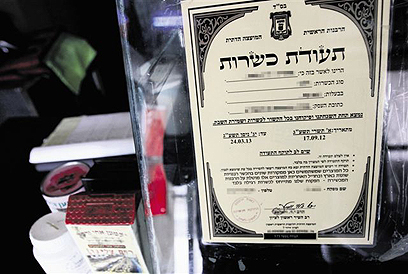
Chief rabbis. Instead of improving system, Rabbinate prefers to fortify walls of enforcement
צילום: גיל יוחנן, אתר שטורעם.נט
Kashrut should be based on trust, not money
Op-ed: There is a prevalent feeling of revulsion towards Israel's kashrut industry, even among the religious society. Regardless of what the amendment to the law says, it will be bypassed, and the Rabbinate will become irrelevant again.
To what extent should the Rabbinate interfere in the citizen's plate? That's the question facing the Ministerial Committee on Legislative Affairs on Sunday with the expected amendment to the Law Against Kashrut Fraud. The answer provided by the law is: From the first course to dessert.

The kashrut industry in Israel generates, according to rough estimates, at least tens of millions of shekels a year, and some say much more. There are about 33 different organizations operating alongside the Chief Rabbinate, which provide different kosher authorizations. The absolute majority of these organizations are ultra-Orthodox and operate on an economic basis, granting a considerable profit to their directors and a fine salary to their employees.
Because there are so many organizations providing kashrut authorizations and because of the Chief Rabbinate's weakness, the kashrut industry is one of the most ill, not to mention corrupt, industries in the State of Israel. It suffers from structural problems of salaries being paid to supervisors by the supervised, an often disgraceful treatment of the supervised bodies by the supervisors, and economic interests.
Kashrut has a national and fundamental aspect. The ability to use the brand "kosher" was given to the Chief Rabbinate years ago as a national body which regulates religious affairs in the State. In practice, we are witnessing an unnecessary clash between religion and the State, because before the State's establishment kashrut was a matter of trust between fellow men or between a man and a business owner.

The kashrut industry, which generates at least tens of millions of shekels a year, is one of the most corrupt industries in Israel (Photo: Avi Moalem) (צילום: אבי מועלם)
The prevalent general feeling towards the kashrut industry, even among the religious society, is of revulsion. The feeling is that kashrut should be based on trust. The need to pay a "kashrut tax" on products and the feeling that even kashrut which was bought for good money isn't really reliable have led to a search for different solutions.
Quite a few businesses across Israel have decided to stop working with supervisors, but remain very meticulous when it comes to kashrut issues. At the same time, as a systematic response, an organization called Hashgacha Pratit ("private supervision") has been founded. The idea is simple: People will guide restaurant owners and owners of businesses in the food industry on how to maintain kashrut rules, and the customers will buy from these businesses out of personal faith in their owners.
These initiatives shocked the Rabbinate, which rushed to fight them courageously, activating enforcement systems against them and imposing fines. While the haredi bodies granting kashrut certificates never bothered the Rabbinate, it was annoyed by these initiatives, which are free of economic interests. The business owners wouldn't despair and turned to the High Court of Justice. Following the petition, the attorney general announced that according to his interpretation of the Kashrut Law, the business owners' actions were legal.
But the business owners' joy is premature. The amendment to the Law Against Kashrut Law, which will be voted on in the coming weeks, will prevent them from even indicating that their business is kosher.
The kashrut affair is a symptom. The fundamental problem is the Chief Rabbinate's perception of its job. Instead of improving the kashrut system and gaining the public's trust, it prefers to fortify the walls of enforcement and coerce the citizens which require its services. This applies both to kashrut and to other issues.
If I may predict, that won't help. The train left the station long ago. Regardless of what the law says, kashrut consumers, even the religious and meticulous ones, will stay away. The way to bypass the law will be found, and the Chief Rabbinate will find itself irrelevant again.
Dr. Shuki Friedman heads the Israel Democracy Institute's Center for Religion, Nation, and State and teaches international and constitutional law at the Peres Academic Center in Rehovot.










